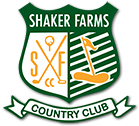The History of Shaker Farms
The legend of Shaker Farms Country Club began long ago before horses hauled cargo along the towpaths from New Haven, CT, to Westfield, MA. Back then, horses pulled colorful canal boats filled with 200-plus passengers and precious cargo. The wide canals ran alongside what is now The Columbia Greenway Rail Trail. Historically, Westfield is known for its production of buggy whips, cigars, and bricks. The sprawling Shaker Farms property was inhabited by native tribes and early religious settlers.
Pocomtuc
It is said the Pocomtuc tribe first inhabited the Westfield area. The Pocomtuc were also known as the Wornocosmeans (Winding Land), which is still an appropriate name today. Walk along any hole of Shaker Farms Country Club and see the natural beauty, lush slopes, and winding brooks meandering through the course.
The Shakers
The story of Shaker, however, had its roots from the rebellious Quaker, Mother Anne Lee. In 1774, Mother Anne Lee brought nine of her followers to America. The Shaker communities spread through New England. It is said that a family of Shakers lived on the land now known as Shaker Farms Country Club.
Like the Quakers, the self-sufficient Shakers were able to separate themselves from society. Their communal families lived in separate dormitory-like quarters for males and females. The Shakers were known for their fine furniture. Celibacy was part of their faith, which is why their communities died out.
The Whispers and Cries of the Shakers
Of the rebellious Quakers known as Shakers, the name itself was a derogatory term used to describe the dancing, shouting, shaking, and “glossolalia" (speaking in strange and unknown languages). These unusual rituals and behaviors were why they were accused of heresy, witchcraft, and fanaticism.
This behavior is still symptomatic today on the same plot of land once inhabited by the Potomac Native Americans and later by the Shakers. If you listen closely, you can hear the whispers and cries of nonsensical words echoing through the winding land as golfers struggle to earn bragging rights at Shaker Farms County Club.
VISIT US
HOURS
HOURS
Golf Course Open - Sunrise to Sunset
In-Season Pub Hours:
Monday - Closed
Tuesday - Friday - 4:00 pm - Close
Saturday - Sunday - 11:30 am - Close
